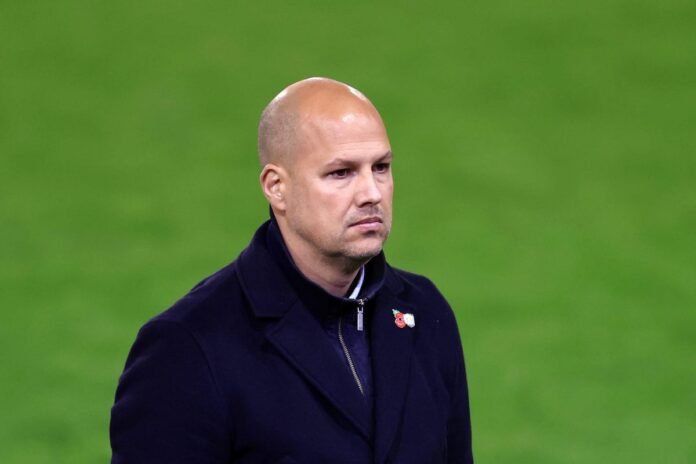When Aston Villa Women announced on Wednesday afternoon that manager Robert de Pauw had left with immediate effect, it was hard to escape the sense that this was a knee-jerk decision. The 43-year-old had only joined the club in the summer from Bayer Leverkusen, replacing Carla Ward, and had been in charge for just nine Women’s Super League (WSL) matches.
It is undeniable that results have been poor: Villa have won only one match in the league, against bottom-of-the-table Crystal Palace. However, they have had tough fixtures, playing all of the top four away from home, and their performances have been far more positive than the results would lead you to believe.
It is astonishing to remember, given today’s events, that after their opening day 1-0 loss to Chelsea, praise was heaped on De Pauw and his Villa team for their clever tactical setup which saw them flood the midfield areas, making it hard for Chelsea to settle on the ball. They almost snatched a point from that match, something no side has done this season, and would have done had it not been for Hannah Hampton tipping Sabrina D’Angelo’s header from a late corner onto the bar.
When De Pauw joined Villa, he said at the WSL media day that his aim was a top-half finish. With six points from their first nine games, Villa are ninth, four points behind Tottenham Hotspur, who are the sixth-placed of the division’s 12 teams. At this time last season, Ward had the same number of points, having won two games compared to De Pauw’s win and three draws. Villa’s expected goal difference per 90 is -0.2, the seventh-best in the league.
They are certainly not far off his stated target at the start of the season, so why has he gone?
On Tuesday, De Pauw posted on LinkedIn that the hardest thing about being a football manager is the “daily choices you have to make”. “Short term, long term. Popular decisions, unpopular decisions. Weekly having to disappoint players because you can only play 11, and have to disappoint 14 others.”
He also wrote: “You need the backing of the club if you want the team to go from average, to good, to better, to top…. I never shy away from difficult decisions and I will certainly not win the popularity contests.”
De Pauw during his final match, a 4-0 loss to Arsenal (Harry Murphy/Getty Images)
On Sunday, he had some strong words about his players after their 4-0 loss to Arsenal, which turned out to be his final match in charge.
“In Holland, we have a saying: ‘You can bring a horse to water, but you cannot force the horse to drink the water’,” he said in the post-match press conference. “It’s up to the players to learn. It’s my job to show them what we need to improve and how to improve.
“So I keep doing that, keep supporting them, keep helping them, and in the end, they have to pick that up and show the quality they have.” Perhaps he was thinking of Villa’s away match against Manchester United last month, when they dominated the whole game, but could only draw 0-0.
De Pauw’s coaching methods are known to be intense, specifically when it comes to fitness. He is demanding and sources with knowledge of the situation, speaking anonymously to be able to talk freely, told The Athletic that some players, including senior members of the squad, did not fully buy into his approach. This was not helped by the fact results were not there to back up the work done on the training field.
This is not the first time De Pauw has had a short tenure at a club. In January 2022, he announced he would leave FC Twente, having only joined in the summer, though he stayed on as coach to the end of the season and won the league there.
Speaking at the time to ESPN, FC Twente captain Renate Jansen said: “A staff is a team and we are a team. They have to make each other better, but they also have to make us better. In the end, it was not right. You have to get the most out of each other, to lift each other to a higher level, and I think that is where it fell short.”
After leaving FC Twente, De Pauw spent two years at Bayer Leverkusen, guiding them to fifth and then sixth-place finishes.
When he arrived at Villa in the summer to become first Dutch manager in the WSL, he was required to overhaul an ageing squad, the oldest in the division.
He had to integrate a large number of new signings made over the summer, and record-signing Gabi Nunes was not fit when the season began, which hampered things in terms of De Pauw being able to build his strongest team quickly.
With those challenges, pulling the plug so early is a particularly big call to make. Perhaps the club felt the direction had been set and De Pauw was not going to be able to deliver what they wanted and so it was better to act swiftly and decisively. But if it was done to appease those who disagreed with his training methods, or to make life easy for Villa’s executives in the short term, it is hard to see it fitting into a strategy for long-term success.
(Top photo: Jess Hornby – The FA via Getty Images)
Read the full article here


